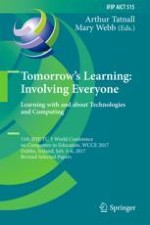2017 | OriginalPaper | Buchkapitel
Informatics Teachers’ Self-efficacy - A Survey Instrument and First Results
verfasst von : Claudia Hildebrandt
Erschienen in: Tomorrow's Learning: Involving Everyone. Learning with and about Technologies and Computing
Aktivieren Sie unsere intelligente Suche, um passende Fachinhalte oder Patente zu finden.
Wählen Sie Textabschnitte aus um mit Künstlicher Intelligenz passenden Patente zu finden. powered by
Markieren Sie Textabschnitte, um KI-gestützt weitere passende Inhalte zu finden. powered by
